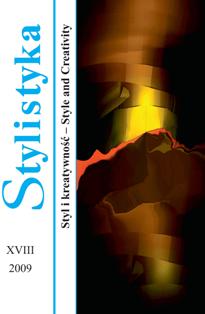RECREATING “HOLY SIMPLICITY”: ROMANIAN RENDITIONS OF JACQUES PRÉVERT’S ALICANTE
RECREATING “HOLY SIMPLICITY”: ROMANIAN RENDITIONS OF JACQUES PRÉVERT’S ALICANTE
Author(s): Gina MăciucăSubject(s): Language and Literature Studies
Published by: Uniwersytet Opolski
Keywords: STYLE SIMPLICITY; FRENCH MODERN POETRY; SEXUALITY VS. SPIRITUALITY; TRANSLATION; ROMANIAN; TRUE-TO-GENIUS-OF-TARGET-LANGUAGE RENDITION; SETTING POETRY TO MUSIC
Summary/Abstract: While still under the spell of Jacques Prévert’s intriguingly unsophisticated Alicante, and in relentless pursuit of uncovering novel strategies for creating literary beauty, I decided to subject the poem to a minute scrutiny in the hope of ferreting out the secret stuff “holy simplicity” is made of. Much to my surprise, “lurking” behind this sancta simplicitas I found a fine network of complex patterns, each carefully designed to interact with the remainder in a flawless manner, thus considerably enhancing the potency of the ensemble. The following are several of the major patterns involved: dichotomous partition into sexuality and spirituality; colour-related symbolism; word play; dual-nature semantic pattern of keywords (signalling interweaving of libido-related and spirit-related zones); interplay of inherent and non-inherent readings of adjectives, of regular and irregular rhymes, or of verses with different-numbered feet (even and odd); effective intermingling of lexemes which synergetically appeal to four human senses. In the second phase, my research was steered away from fathoming the miracle of creating “holy simplicity” towards investigating the sustained toil of recreating it in a different language: Romanian. The two subsections devoted to the topic in question submit to the reader Gellu Naum’s translation of Alicante, and the one originating with none other than the author of this contribution respectively. A brief comparison of the two renditions has yielded the following points of dissimilarity: a) Naum’s is a true-to-spirit translation, whereas mine has been created with the genius of the target language in mind. Herefrom stem the main contrasts listed below. b) Naum keeps on the fruit (Fr signifier orange, Rom signifier portocalã), while I made so bold as to replace it by the equally exotic mango for reasons specified under III.2 below (s. also substitution of noptierã (= bedside table) and dormitory (= bedroom) for masã (Fr table) and pat (Fr lit) respectively. c) Naum completely disregards the pun in line 4, whereas I did not think twice about slightly modifying the rhythmic pattern in order to be able to render the former into Romanian. d) Likewise, Naum translates in utter defiance of the rhyming pattern, whereas to me observing it is a matter of prime importance. Needless to say, I am quite willing to take both the blame and the credit – if any – for the vast array of meanings I took the liberty to read into Prévert’s poem, as well as for the translational licences resorted to in the hope of successfully putting these unique connotations across to the reader. The concluding section discusses still a further possibility of recreating Prévert’s Alicante, namely by setting it to music. In this respect, Chuck Perrin’s rendition has the added advantage of enhancing its lyricism, while concurrently taking the poem to that magical space hovering above the spiritual.
Journal: Stylistyka
- Issue Year: 2009
- Issue No: XVIII
- Page Range: 301-321
- Page Count: 1
- Language: English

